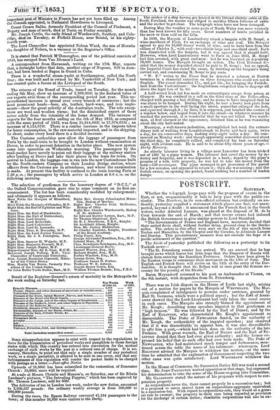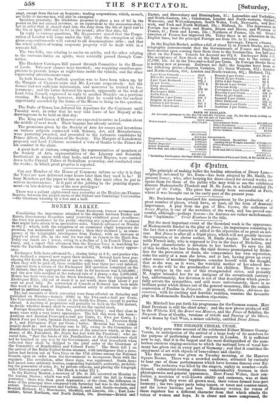There was an Irish dispute in the House of Lords
last night, arising out of a motion for papers by the Marquis of WESTSIEATH. The Mar- quis complained of indulgences to persons under sentence, granted by Earl St. Germans, which wore a political aspect ; but the Earl of ABER- DEEN showed that the Lord-Lieutenant had only taken the usual course in such cases. The Marquis also strongly blamed the appointment of Mr. Keogh; describing some speeches imputed to that gentleman as "high treason." He was followed by the Earl of DEED; and by the Earl of EGLINTON, who characterized Mr. Keogh's appointment as disreputable. The Duke of NEWCASTLE denied, on the authority of Mr. Keogh, the authenticity of the imputed speeches ; and observed that if it was discreditable to appoint him, it was also discreditable to offer him a post,—which had been done on the authority of the late Premier. With great warmth, the Earl of DERBY and the Earl of Ea- Tarnow denied that they had ever given authority; and the former ex- pressed his belief that no such offer had over been made. The Duke of NEWCASTLE, who had maintained much temper and forbearance, men- tioned across the table the name of his informant : whereupon, Lord EGLINTON advised the Marquis to withdraw his motion,—at the same time he admitted that the explanation of Government respecting the two other cases was quite satisfactory. Lord W. zsTmEATR withdrew the
motion. In the House of Commons, the Succession Duties Bill was read a second time. Sir Jomc PAKINOTON waived opposition at that stage, but expressed his determination to take the sense of the House ongoing into Committee. Mr. GLADSTONE stated the nature of his proposals with respect to cor- poration property.
As corporations never die, there cannot properly be a succession-tax ; but it is proposed to assess annual taxes on corporations-aggregate equivalent to a succession-tax. With regard to corporations-sole, they would as a gene- ral rule be exempt ; the property in their case being regarded as provision for the discharge of certain duties ; charitable corporations will also be ex- empt, except from the tax on bequests; trading corporations, which, as such, are liable to income-tax, will also be exempted.
Speaking generally, Mr. Gladstone proposes to place a tax of 6d. in the pound on the net annual revenue, as an equivalent to the succession-duty ; but in order that it should start fair, the duty from the 5th of April last to the 5th of April 1860 will be 3d. iu the pound ; after that date, 6d.
In reply to various questions, Mr. GLADSTONE stated that the Corpo- ration of London will come under the bill ; that the exemption of reli- gious corporations-sole will extend to all denominations alike ; and that the whole subject of taxing corporate property will be dealt with in a separate bill.
The two bills, one relating to excise on spirits, and the other relating to the customs-duties on spirits, were severally passed through Com- mittee.
The Hackney Carriages Bill passed through Committee in the House of Lords. Two new clauses were inserted ; one requiring omnibus-pro- prietors to provide lamps at night-time inside the vehicle, and the other suppressing advertisement-vans.
In both Houses the Turkish question was to have been taken up, by the Marquis of CLANRICARDE and Mr. LATARD respectively : but the former had not sufficient information, and moreover he trusted in Go- vernment ; and the latter deferred his speech, apparently at the wish of Lord John Russell, expressed in reply to another Member on a previous evening. Mr. Layard, however, stated that he would take the earliest opportunity accorded by the forms of the House to bring ou the question.

























 Previous page
Previous page